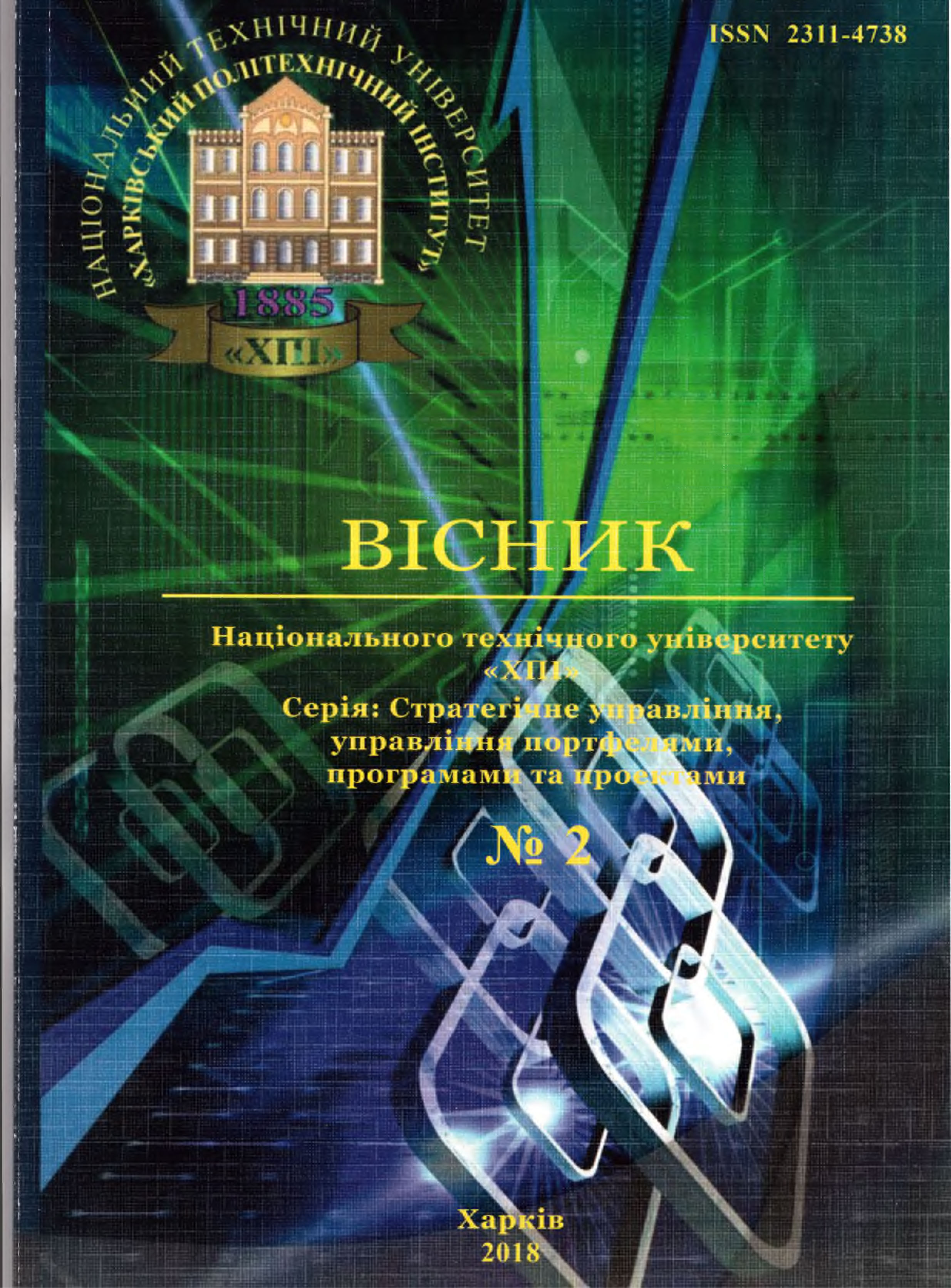LEADERSHIP IN THE CONTEST SYSTEM OF THE PROJECT MANAGEMENT BEHAVIORAL COMPETENCES
DOI:
https://doi.org/10.20998/2413-3000.2018.1278.12Keywords:
leadership, leadership qualities, leadership potential, system of training of specialists, behavioral competences, pedagogical technologiesAbstract
The predominance of the group nature of the activity of experts in project management makes high demands on their personal development and, consequently, on the introduction of their behavioral competencies. In the system of these competencies the leading place belongs to management. Therefore, the identification of potential leaders and the subsequent targeted development of their leadership potential are an important task of the educational process. On the basis of generalization of the practical experience of this activity, ways, methods and pedagogical technologies that help to successfully solve this problem are considered. The paper suggests effective methods for developing leadership potential. They are based on the application of innovative pedagogical technologies, new methods and techniques that reflect the world experience of project management. One of such methods is the formation in the future specialist of a unified unification of professional and social competencies. The main pedagogical technologies include the formation of a command character in project management. This is an important factor in the effective implementation of project activities when students master the basic provisions of the system of behavioral competencies. This requires not only the preparation of a specialist of high professional and social competence, but also the training of a specialist capable and ready for self-training and self-improvement. To identify potential leaders among students, it is proposed to use active teaching methods such as business and role games, problem analysis, tests, questioning and diagnosing the level of development of certain personal qualities. In the article, for an objective and fair assessment of the student's leadership potential, it is suggested to use an open or anonymous assessment of each other's students by the students. When identifying and developing leadership qualities among students as future specialists in project management, it becomes necessary to develop leadership skills for each teacher. The teacher's leadership manifests itself in benevolent demand, in an effort to help each student build his own life trajectory and consistently and persistently introduce it into the practice of his activities and behavior, and the character interacts and relationships with other people.References
Casse P., Claudel P. G. Philosophy for Creative Leadership: How philosophy can turn people into more effective leaders. [S. p.], Athena Press, 2007. 280 p.
Bass B. M., Riggio R. E. Transformational leadership. 2nd. еd. Mahwah ; NJ, Lawrence Erlbaum Associates, 2006. 282 p.
BoyacisR., Makki E. Rezonansnoe liderstvo: samosovershenstvovanie i postroenie plodotvornyh otnoshenij s lyud'mi na osnove aktivnogo soznaniya, optimizma i ehmpatii [Resonant leadership: self-improvement and building fruitful relationships with people on the basis of active consciousness, optimism and empathy]. Moscow, Al'pina Biznes Buks, 2007. 300 p.
Reznichenko M. A., Lanskih M. V., Ponomarev A. S., Pazynich S. N. Rukovodstvo i liderstvo: filosofsko-psihologicheskij analiz: ucheb. Posobie [Governance and leadership: the philosophical and psychological analysis: Textbook]. Belgorod, ID «Belgorod», 2012. 136 p.
Zavyetnyy S. O., Ponomar'ov O. S., Pazynich S. M. Filosofiya vplyvu: monohrafiya [Philosophy of influence: monograph]. Kharkiv, Savchuk O. O. Publisher; KhNTUS·H im. P. Vasylenka, 2011. 204 p.
Romashov O. V., Romashova L. O. Sociologiya i psihologiya upravleniya [Sociology and psychology of management]. Moscow,EHkzamen, 2002. 512 p.
Bushuev S. D., Bushueva N. S. Natonal Competence Baselne, NCB UA. Verson 3.1. Kyiv, ІRІDІUM, 2010. 208 p.
Ponomar'ov O. S. Povedinkovi kompetentsiyi v upravlinni proektamy: navch.-metod. posibnyk [Behavioral competencies in project management: teaching method. manual]. Kharkiv, Publ. «Pidruchnyk NTU «KhPI»», 2016. 216 p.
Romanovs'kiy O. H., Ponomar'ov O. S., eds. Rozvytok liders'koho potentsialu natsional'noyi humanitarno-tekhnichnoyi ta upravlins'koyi elity: Monohrafiya [Development of the Leadership Potential of the National Humanitarian, Technical and Management Elite: Monograph]. Kharkiv, FOP Mezina V. V., 2017. 292 p.
Berdyaev N. A. Smysl istorii. Novoe srednevekov'e [The meaning of history. New Middle Ages]. Moscow, Kanon+, 2002. 448 p.
Downloads
Published
Issue
Section
License
Copyright (c) 2018 Марина Анатоліївна Гринченко, Олександр Семенович Пономарьов, Олена Володимирівна Лобач

This work is licensed under a Creative Commons Attribution-NonCommercial-ShareAlike 4.0 International License.
Our journal abides by the Creative Commons copyright rights and permissions for open access journals.
Authors who publish with this journal agree to the following terms:
Authors hold the copyright without restrictions and grant the journal right of first publication with the work simultaneously licensed under a Creative Commons Attribution-NonCommercial-ShareAlike 4.0 International License (CC BY-NC-SA 4.0) that allows others to share the work with an acknowledgement of the work's authorship and initial publication in this journal.
Authors are able to enter into separate, additional contractual arrangements for the non-commercial and non-exclusive distribution of the journal's published version of the work (e.g., post it to an institutional repository or publish it in a book), with an acknowledgement of its initial publication in this journal.
Authors are permitted and encouraged to post their published work online (e.g., in institutional repositories or on their website) as it can lead to productive exchanges, as well as earlier and greater citation of published work.

